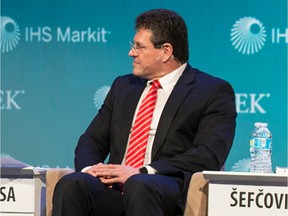
Article content
The planet’s net-zero goals are at risk of crashing on the rocks, as geopolitics, unrealistic time frames and the costs of this complex transformation more clearly come into focus.
The easy part is saying we need to decrease emissions; getting there is another matter entirely.
Article content
The energy transition, says Carlos Pascual, senior vice-president for global energy and international affairs at S&P Global Commodity Insights “is faster and more complicated than anything we have ever done in history . . . the economic impact, the commercial implications and the geopolitical implications are unprecedented.”
Advertisement 2
Article content
Pascual — who also held diplomatic posts as the U.S. ambassador to Ukraine and to Mexico, was recently in Calgary delivering the annual PETRONAS lecture hosted by the University of Calgary’s Haskayne School of Business. The event invites speakers from around the world, bringing a broad perspective of the energy sector to the Calgary business community.
The transition also can’t happen without ensuring energy security.
The challenges are real: The world needs to address the effects of climate change and build tomorrow’s energy systems, but at the same time it must meet current energy demand and decarbonize the existing supply. Additionally, the pace is constrained by the fact only 50 per cent of the technologies needed to achieve net-zero targets have been developed, in addition to the very real challenge of regulatory environments in parts of the world that don’t move at the speed of business — or climate change.
That means, according to Pascual, the world needs to reconsider its unrealistic time frames and expectations. It’s a classic Catch-22 situation; the cost of moving too quickly, Pascual says, could have a significant effect on the global economy. At the same time, not moving fast enough to decrease emissions risks increasingly harsher consequences of climate change, of which 2023 provided a glimpse.
Article content
Advertisement 3
Article content
The world is stuck between aspiration and reality — and that’s before the geopolitical issues are considered.
The wars in Ukraine and Gaza land squarely on the issue of security of supply for both oil and natural gas, while the upcoming U.S. election injects a significant element of uncertainty into the entire decarbonization agenda and the ability of the U.S. to take a leadership role. The recent freeze in the granting of liquefied natural gas permits by U.S. President Joe Biden adds further uncertainty to the issue of energy security and the imperative to decarbonize — where LNG can play an important role.
The question is what all this means for Canada and its net-zero goals.
There is no denying the fact dollars have flowed to opportunities in the U.S., as companies have taken advantage of the simplicity — and generosity — of the Inflation Reduction Act. At the same time, Pascual is a believer in carbon capture and storage, which he calls the world’s biggest hedge on emissions reductions and is a solution that will provide “tangible and immediate” results.
This should underscore the need for both the federal and provincial governments to expeditiously pass legislation supporting Investment Tax Credits for CCS and CCUS that will unlock significant private sector investment in Canada. Until there is clarity on both the ITCs as well as regulatory approval, Canada’s ability to seize the decarbonization opportunities Pascual speaks of will either be delayed or, worse, cancelled.
Advertisement 4
Article content
There is nothing quite as compelling as listening to someone who brings a global perspective and distils its relevance to the local level. Such is the intent of the annual lecture, and this year’s event did not disappoint.
In less than an hour, Pascual presented a concentrated lesson in risk management, scarcity of resources, and the imperative for collaboration cast in the context of climate change and geopolitics — critical information and perspective for anyone in the energy sector. Unlike many of the siloed and polarized conversations that often take place on the subject, this was a unique opportunity to understand the complex issues from all angles.
It’s something that we need more of, not less.
Deborah Yedlin is the president and CEO of the Calgary Chamber of Commerce.
Article content



